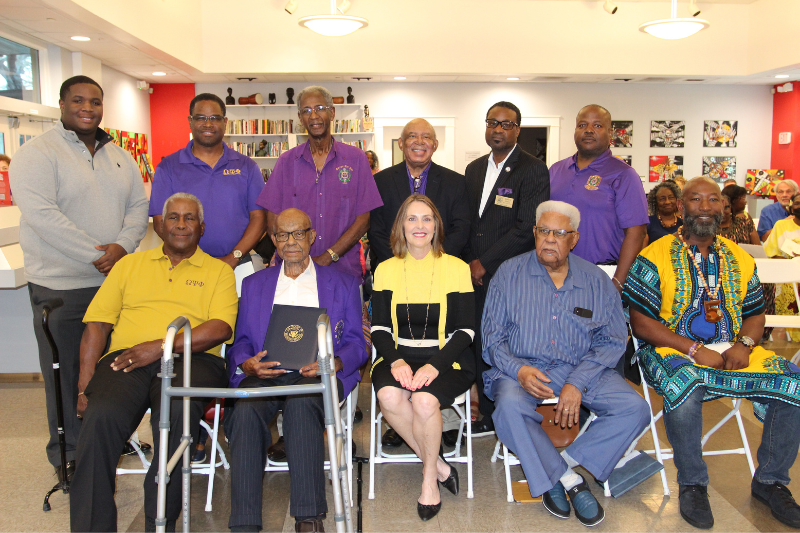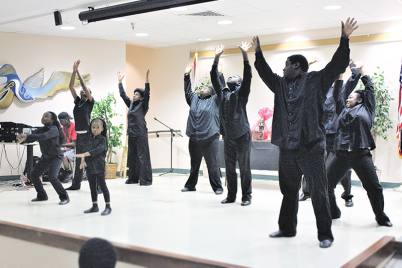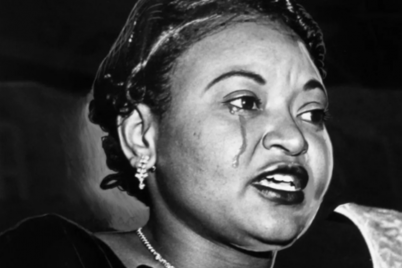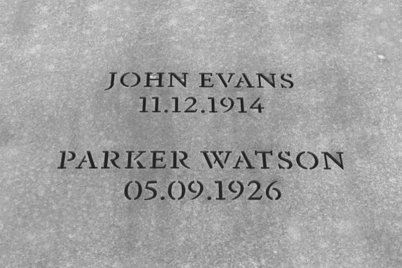U.S. Rep. Kathy Castor hosted her annual Black History Month program on Feb. 24 to honor community leaders by recording their legacies into the Congressional Record at the U.S. Library of Congress. Bridgette Heller, Bishop Preston D.H. Leonard and Mordecai Walker took honors this year.
BY RAVEN JOY SHONEL, Staff Writer
ST. PETERSBURG – U.S. Rep. Kathy Castor hosted her annual Black History Month program on Feb. 24 to honor community leaders by recording their legacies into the Congressional Record at the U.S. Library of Congress
This year’s event at The Woodson African American Museum of Florida honored Bridgette Heller, Bishop Preston Leonard and Mordecai Walker for their extraordinary contributions to the community.
Before Castor read the congressional statements, she took the audience back to July 13, 2022, when the statue honoring civil rights and women’s rights activist Dr. Mary McLeod Bethune was unveiled in the United States Capitol in Washington, D.C., representing Florida in the National Statuary Hall Collection.
Two statues represent every state in Statuary Hall at the Capitol. One of Florida’s statues is John Dory, the inventor of air conditioning. The other statute, for 100 years, was an obscure Confederate General installed by the State of Florida during the Jim Crow era. Edmund Kirby Smith was the last Confederate General to surrender to the Union and then fled to Mexico.
“But after the tragedy at Mother Emanuel AME Church in Charleston, S.C., states and communities began reexamining their symbols, and their statutes and their flags,” Castor explained. “I helped initiate a process to replace that Confederate General, and the Alumni Association of Bethune Cookman University also took up the charge.”
Castor said after many years and a lot of hard work by many people, Florida is now the first state to have an African American represent it in the National Statuary Hall Collection. The marble used to carve Bethune Cookman’s likeness was sourced from the same quarry Michelangelo used to carve the David. It was crafted by Nilda Comas, the first Hispanic-American woman to sculpt a piece for Statuary Hall.
Bridgette Heller
Born and raised in St. Petersburg, Bridgette Heller attended segregated schools through elementary school but credits her success during her formative years to being raised by a village of love that had very high standards for her. She achieved in higher education at Northwestern University, earning a bachelor’s degree and then a master’s degree from the Kellogg Graduate School of Management. Heller continues to contribute to her alma mater, serving on the university board for trustees and mentoring the next generation of business leaders.
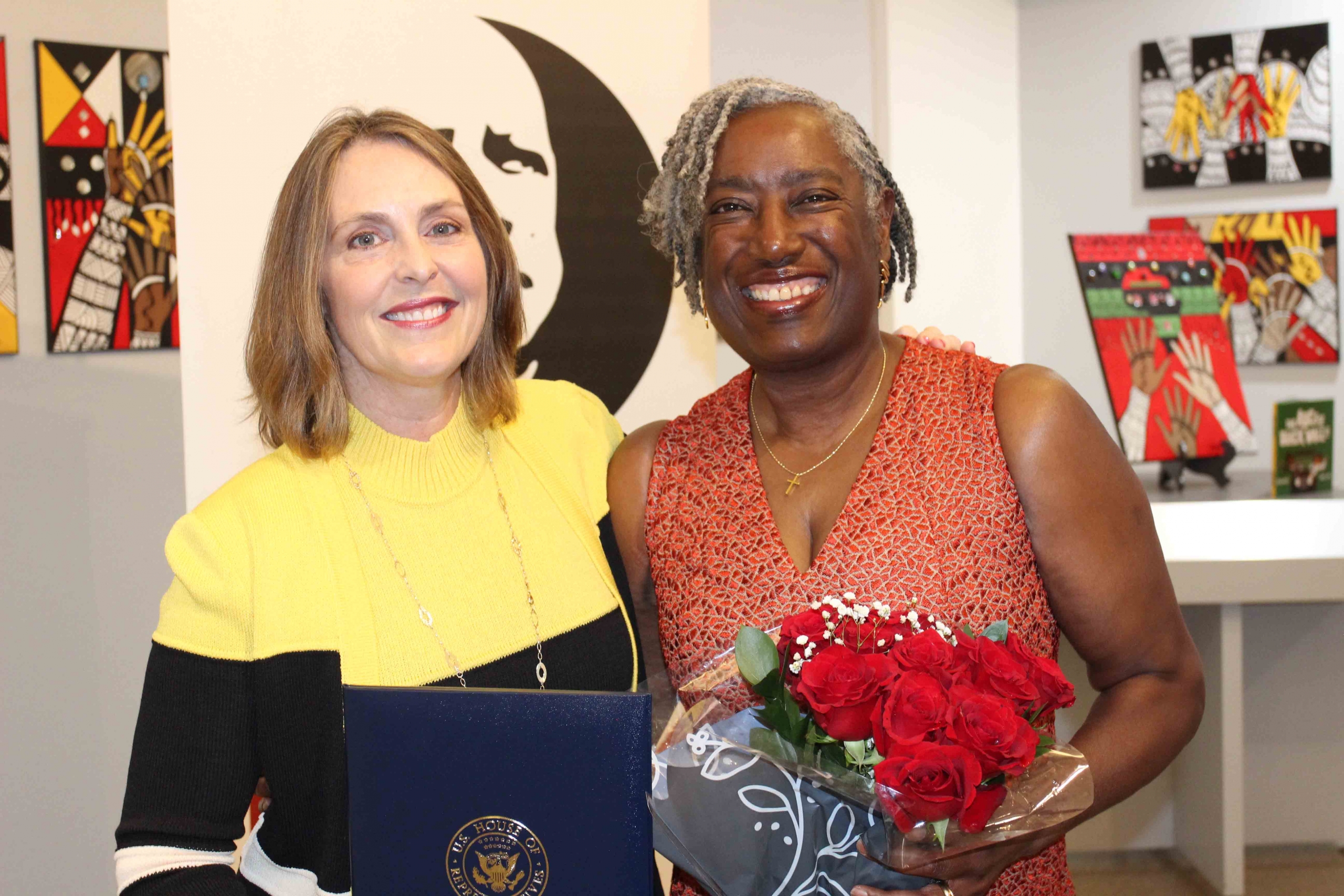
U.S. Rep. Kathy Castor and Bridgette Heller
After graduating from Northwestern University, Heller spent more than 35 years serving in leadership positions in numerous fortune 100 companies and private equity owned enterprises, such as Johnson and Johnson, Merck and Kraft Foods, where she worked for more than 18 years. While serving as executive vice president of Merck and president of its consumer care division, she led an organization of approximately 2,400 employees and helped the company expand across the globe.
In honor of all her many accomplishments in the business world, Heller was named one of the 50 most powerful Black women in business by “Black Enterprise” magazine and a woman to watch by Advertising Age and Healthcare Businesswomen’s Association woman of the year.
She also founded her own consulting firm and has served as a corporate director for numerous companies. Heller is an advocate for diversity, equity, and inclusion and has traveled the world to reinforce infant and maternal health, inclusive C suite for women and sustainable communities. She is a co-founder and CEO of the Shirley Proctor Puller Foundation, named in honor of her mother.
Under her leadership, the Shirley Proctor Puller, establish the M.A.S.T.R. Kids program, initially focused on helping to minimize the summer learning loss students experience between terms. The program achieved remarkable results; 80 percent of the students enrolled avoided the summer slide, and three quarters experience gains in their math and reading proficiencies.
Keller also continues to give back to her community by helping the youth of south St. Pete bridge the achievement and literacy gaps. Her work has allowed countless students to advance their education and STEM fields and improve both their math and reading aptitude. She has worked tirelessly to achieve her long-term goal of improving the educational experience and outcomes, raising high school and college graduation rates, which will lead to better economic opportunities, and a more prosperous St. Petersburg.
Heller serves on the board of the Foundation for a Healthy St. Petersburg, working to provide equity and prosperity to her community by treating not just the symptoms of inequality but creating a community that benefits everyone. By providing both project funding and training sessions, she gives those in her community the tools to improve their lives and fuel innovation.
Bishop Preston D.H. Leonard
Bishop Preston D.H. Leonard inspires us all through his lifetime of public service deeply rooted in his faith. For more than 60 years he has served as pastor at Christ Gospel Church of St. Petersburg. Leonard is the only living pastor in the church’s history and has the longest tenure of any pastor in the St. Petersburg area.
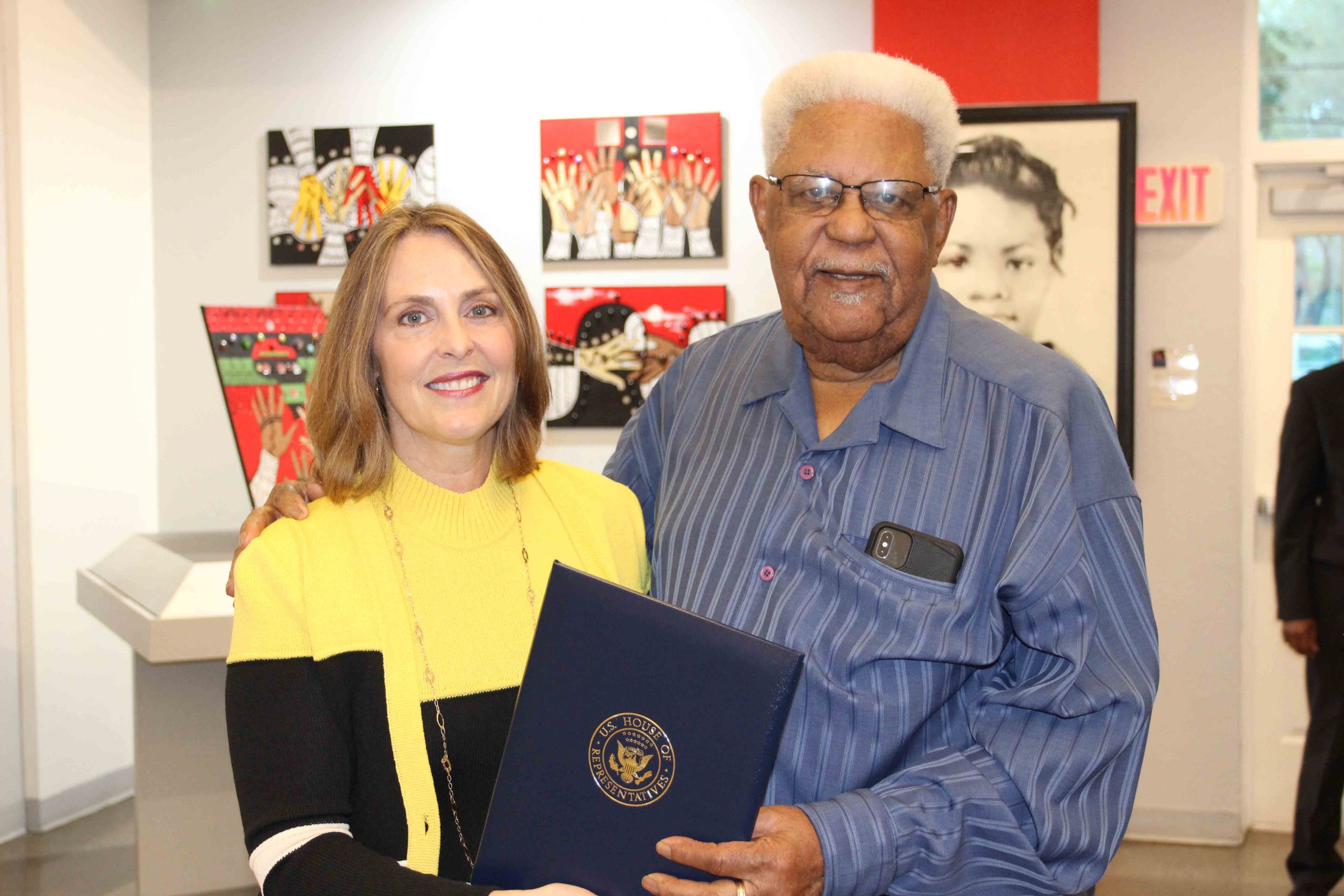
U.S. Rep. Kathy Castor and Bishop Preston D.H. Leonard
He serves as the presiding bishop of Christ Kingdom International Fellowship and is the international bishop of the Christ Gospel Churches of Jamaica Apostolic, Haiti and Ghana, Africa.
Leonard was born in the town of Lloyd, located in north Florida, to Titus and Vanny Walker Leonard. He’s the sixth of seven children. His commitment to faith started early at the age of 10 and became a member of the fellowship Missionary Baptist Church in Monticello, Fla.
Leonard was baptized in 1954 and ordained later that year. Also in 1954, Leonard married the love of his life the former Virginia Mosely. Together they share their seven children, 16 grandchildren and six-great grandchildren.
Leonard and his family moved to St. Petersburg in 1957. And since then, he’s been fiercely committed to the service to both God and community through a broad range of experiences. For more than 40 years, he hosted a radio ministry broadcasted on 1590 W. R. XB, a longtime voice in the St. Petersburg African-American community.
He is a past president of the Interdenominational Ministerial Alliance and previously served on the Biracial Advisory Committee of the Pinellas County School Board, the state screening or regulatory committee, the ombudsman for state nursing homes, and the Tampa Bay Regional Planning Council and the Area on Aging.
In 1997, he was recognized as ministers in a year. Today, Leonard serves as a charter member of the St. Petersburg Community Alliance as well as on the board of directors of the IMA Human Services and the St. Petersburg Interfaith Alliance.
Leonard received both his bachelor’s and master’s degrees from International University. Before this, he attended Florida A&M University, pastoral school and Clyde Narramore Counseling School. He was also a member of the United States Navy Corps in Bainbridge, Md.
Mordecai Walker
Mordecai Walker was born in Citrus Park in rural Hillsborough County on July 4, 1924, to Charlie and Pearl Walker. He attended segregated schools in Hillsborough County: Citrus Park School for Colored Children, Booker T. Washington Junior High and Middleton High School, were graduated in 1943.
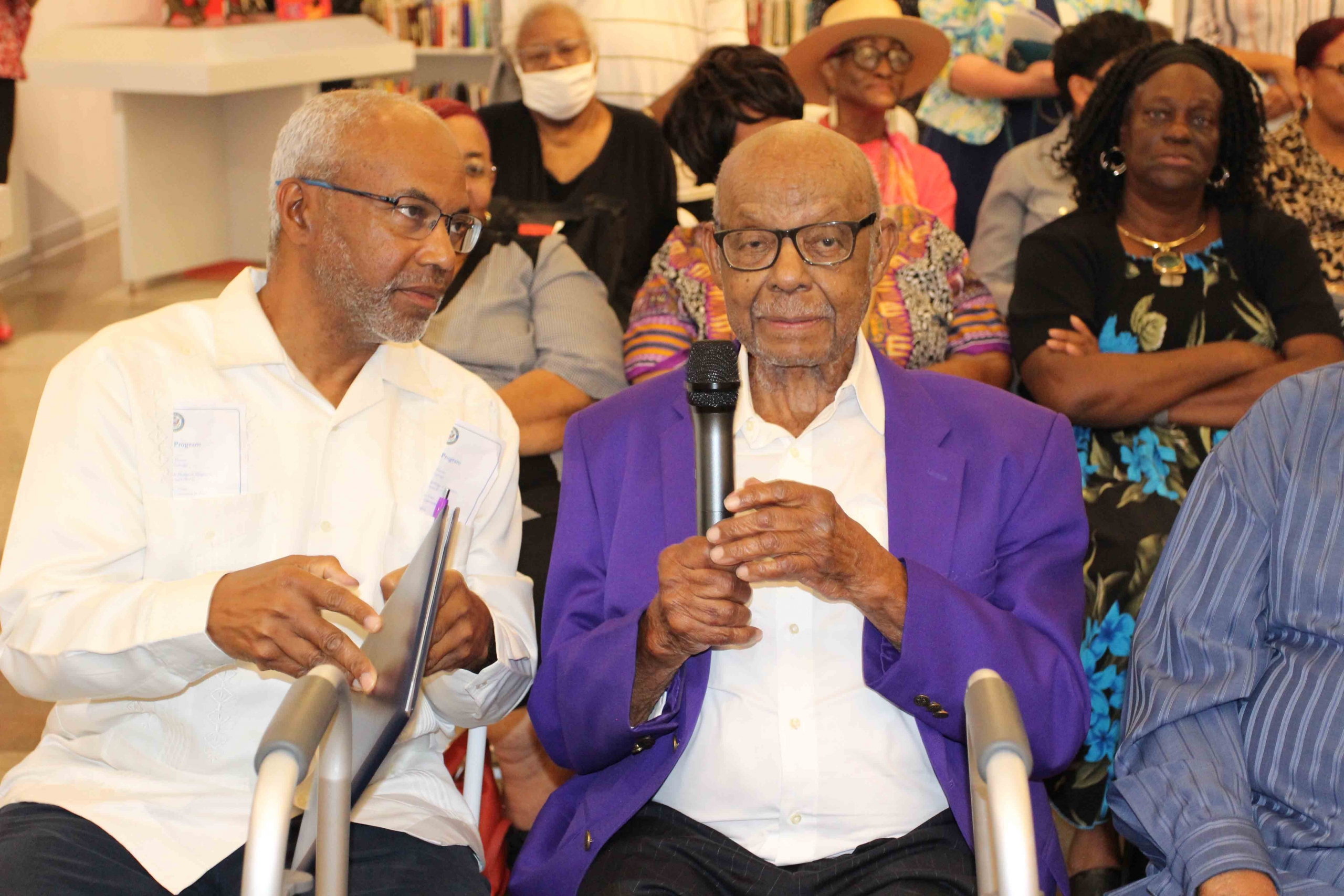
Andrew Walker with his father, Mordecai Walker.
Walker started his college education at Bethune Cookman College, where he had the distinct honor of shaking the hand of First Lady Eleanor Roosevelt and Dr. Mary McLeod Bethune. However, as the war continued in Europe and the South Pacific, Walker was drafted into the U.S. Army, where he served overseas in New Guinea.
After attaining the rank of sergeant and completing his enlistment in 1946, Walker returned to higher education at Tennessee State University, where he completed his master’s degree in agriculture, and then went on to earn his master’s degree in Ag from Florida A&M University. As a student at TSU, Walker was an essay winner for writing “America’s Most Popular Athlete,” writing that Joe Lewis was more popular than Jackie Robinson.
For winning his essay, he was given an all-expense paid trip to New York City to see Joe Lewis fight. And during that trip, Walker remembers going to an integrated New York City theater to see “Gone with the Wind.”
While at TSU, Walker completed competed on the track team with Olympian Mickey Patterson and Ed Temple, who later became an Olympic coach. In 1950, he was initiated into the Rho Psi Chapter of Omega Psi Phi Fraternity.
Walker would go on to become one of the original seven founders of Eta Rho Graduate Chapter St. Petersburg, Fla., in 1962, where he also served as chapter Basileus from 1991 to 1993. After more than 70 years of service, he remains active in the local chapter, and is still committed to Omega’s four cardinal principles: manhood, scholarship, perseverance, and uplift.
After graduating from TSU, Walker returned to Tampa to teach at an elementary school in Plant City, and later Milton High School in Tampa, where he was the driving force in establishing the agriculture program. He was pivotal in creating a curriculum and funding sources to bring the program to fruition.
After his short stint in Hillsborough County, he relocated to Pinellas, where he spent more than 30 years teaching, advancing and developing Ag initiatives for the students. He was inducted into TSU’s Agriculture Hall of Fame for his 30 plus years of service to advancing the field of agriculture and education.
In 2019, he was also inducted into the City of St. Petersburg Senior Hall of Fame for its services of volunteering to help the quality of life for residents of St. Petersburg.
Walker is known for overcoming adversity. Coming of age during the era of segregation, he acted with dignity and grace, showing respect to everyone around him even when he was not afforded that same respect.
During the Civil Rights Movement, he was active in the Ambassador’s Club, which was a civic club that worked to address the ongoing fight for civil rights, as well as celebrating the community’s achievements. Walker is the oldest living member of the historic Gas Plant community, which was the second African-American neighborhood formed in St. Petersburg.
This historic community thrived from business, entertainment, education. It was a place for working-class African Americans; unfortunately, many families were uprooted during the expansion of I-275 during the 1970s, but it’s inspiring today to know that efforts are underway to restore the legacy of historic Gas Plan community.

